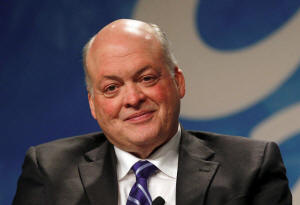|
Ford names Hackett as CEO to tackle car
rivals, Silicon Valley
 Send a link to a friend
Send a link to a friend
 [May 23, 2017]
By David Shepardson and Joseph White [May 23, 2017]
By David Shepardson and Joseph White
WASHINGTON/DEARBORN, Mich. (Reuters) - Ford
Motor Co <F.N> abruptly named James Hackett as chief executive on
Monday, responding to investors' growing unease about the U.S.
automaker's slumping stock price and its ability to counter threats from
longtime rivals and Silicon Valley.
Ford Chairman Bill Ford Jr., whose family effectively controls the U.S.
No. 2 automaker, said he wanted Hackett to speed up decision-making and
cut costs, but did not offer specifics on how the new CEO should change
operations.
"The clock speed at which our competitors are working …requires us to
make decisions at a faster pace," said Ford Jr., who plans to take a
more active role at the company, according to a person briefed on the
matter.
Ford, which announced plans to cut 1,400 white-collar positions last
week, is expected to look at further significant cost cuts in the next
three to six months, according to company officials, speaking on
condition of anonymity as the plans have not been finalized.
Hackett, 62, known as a turnaround expert who for the past year has led
the Ford unit developing self-driving cars and related projects,
replaces Mark Fields, 56, who spent less than three years as CEO.
Fields' abrupt dismissal caught nearly all at Ford by surprise, but
concerns about the company's direction have been brewing for some time.

Ford, once the most financially secure of the 'Big Three' Detroit
automakers, and the only one not to take U.S. government money in the
U.S. auto industry bailout a decade ago, reported record profit in 2015,
but now finds itself under pressure on all sides as overall U.S. auto
sales fall.
Rival General Motors Co <GM.N> is aggressively targeting Ford's share of
the lucrative North American truck and sport utility business, the
source of 90 percent of Ford's profit.
Meanwhile, investors see Ford as a laggard in the shift toward electric
vehicles, self-driving technology and ride-sharing. Ford's $44 billion
market value is below electric car pioneer Tesla Inc's <TSLA.O> $51
billion.
Bill Ford and other descendants of company founder Henry Ford
effectively control the automaker through a special class of shares, but
many investors share his concern that the company is running out of
time.
Ford shares closed up 2.1 percent at $11.10. At Friday's close, they had
fallen 37 percent since Fields took over three years ago at the peak of
the U.S. auto industry's recovery from the crisis last decade.
The automaker has tangled with U.S. President Donald Trump, who spent
more than a year criticizing the company on the campaign trail for
expanding operations in Mexico and exporting U.S. jobs. A Ford
spokeswoman said Trump was not a factor in Fields' departure.
NO SMOKING GUN
Overall U.S. auto sales are slipping after a long boom. But GM has moved
faster than Ford to slash unprofitable operations, and Tesla has been
quicker to deploy new technology.
Bill Ford indicated the company would take more aggressive action to cut
costs. "We have to modernize the business" and move "decisively to
address underperforming areas," he said.

Hackett, who overhauled furniture maker Steelcase Inc <SCS.N> and then
turned around the ailing University of Michigan football program,
becomes the latest in a line of non-family CEOs brought in with a
mandate to change the management culture at one of the auto industry's
oldest institutions.
That task has frustrated many of his predecessors, including Bill Ford,
who had been CEO before replacing himself in 2006 with Boeing Co <BA.N>
executive Alan Mulally.
The decision to replace Fields did not result from a single event, Bill
Ford told Reuters.
"There is no smoking gun here," he said. "It's more the way we are
organized, the way Jim is going to streamline the organization."
[to top of second column] |

Newly named Ford Motor Company president and CEO James Hackett
answers questions during a press conference at Ford Motor World
Headquarters in Dearborn, Michigan, U.S., May 22, 2017.
REUTERS/Rebecca Cook

As CEO of Steelcase, based in Grand Rapids, Michigan, Hackett
slashed thousands of jobs and refocused the company on innovation.
A former Ford director and interim athletic director at the
University of Michigan, Hackett was tapped in March 2016 to run Ford
Smart Mobility, a unit established to oversee and coordinate forays
into autonomous driving, ride sharing and other ventures.
In that role, he helped oversee Ford's acquisition of San Francisco
ride-sharing company Chariot and its $1 billion investment in Argo
AI, a self-driving startup focused on robotics and artificial
intelligence.
PRESSURE IN DETROIT
The upheaval at Ford underlines pressure on all three major Detroit
automakers to prove they can avoid losses as the U.S. market begins
to slow from last year's record sales.
GM CEO Mary Barra is fending off attacks from hedge fund Greenlight
Capital, which wants to install new directors and split the
company's stock. In March, GM sold its money-losing Opel division to
France's PSA Group <PEUP.PA>, effectively exiting Europe in a move
Barra promised would free cash for share buybacks.
The shake-up at Ford may bring scrutiny to its own plans in the
region. The company posted a record $1.2 billion profit in Europe
last year but warned that the impact of Britain's vote to leave the
European Union would put a dent in 2017 earnings.
Under a broader shake-up announced on Monday, former Ford of Europe
chief Jim Farley will become president of a new "Global Markets"
group that will include Ford's regional sales and marketing
operations around the world as well as its Lincoln luxury brand.

The company is also putting government relations and corporate
communications under Ford Jr., and Hackett said the great-grandson
of Henry Ford would have a higher public profile.
Fields, who earned $22.1 million in 2016 and had a 28-year-career at
Ford, also faced a clamor for share repurchases at the company's
annual meeting earlier this month.
Fields declined to comment when reached on Monday.
Ford said last week it would cut 1,400 staff positions in North
America and Asia, a small fraction of the 20,000 job reductions some
news outlets had reported were imminent.
The company reported a record $10.4 billion in pretax earnings in
2016, but investors were concerned by a weak first quarter and lower
profit forecast for 2017, as well as higher costs for investments in
"emerging opportunities."
(Additional reporting by Laurence Frost in Paris, Edward Taylor in
Frankfurt, Costas Pitas in London, Ismail Shakil in Bengaluru,
Andreas Cremer in Berlin; Writing by Nick Zieminski; Editing by Lisa
Von Ahn and Bill Rigby)
[© 2017 Thomson Reuters. All rights
reserved.]
Copyright 2017 Reuters. All rights reserved. This material may not be published,
broadcast, rewritten or redistributed.

 |